Word-of-mouth may keep law firms alive, but with 96% of people Googling for legal advice, an unmissable online presence is your ace in the hole.
And since Google’s the one putting your law firm on the search map, expert legal content alone won’t cut it. What it really wants are trust signals — backlinks from high-authority sites that point to your law services. Earn that trust, and clicks, traffic, and conversions will follow.
While those backlinks are tough to secure, many professionals delegate the challenge to link-building services for lawyers — SEO or link-building agencies specializing in high-quality backlinks from renowned law-focused platforms where your firm can gain credibility and be discovered by potential clients.
But using link acquisition services? Some might hesitate, especially after trusting the wrong ones and getting nothing but plummeting traffic and a wrecked SEO ranking in return.
That’s why we’ve done the homework for you. In this post, you’ll find the top SEO link-building services for attorneys in 2025 — carefully vetted for solid reputations, long-term results, and real praise from legal professionals.
1. Editorial.Link
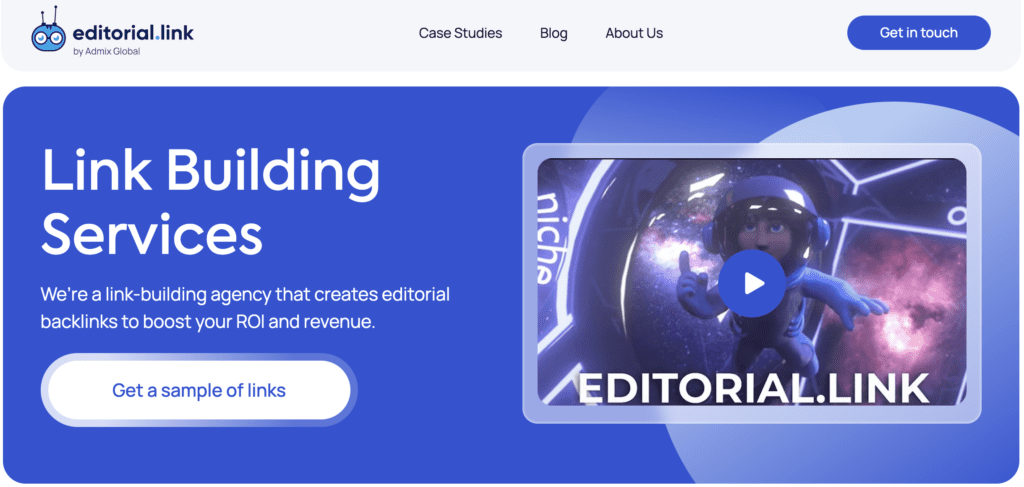
Editorial.Link is a trusted link-building agency with a proven track record of delivering high-quality editorial backlinks to 500+ global brands — including law firms, attorneys, and legal experts aiming to ramp up their online presence.
🧰 What’s there for law firms?
With a wide range of services, legal professionals will find Editorial.Link to be an invaluable resource for:
👉 White-label link-building — perfect for large legal networks looking to build their online brand with customized, branded link-building strategies.
👉 Editorial links — securing link placements in high-performing legal blogs, publications, educational sites, industry association content, and thought leadership platforms.
👉 Listicle link-building — gaining placements in highly-ranked listicles focused on legal topics for better visibility and traffic.
👉 PR campaigns — developing unique legal content and running campaigns to promote it, getting your firm noticed and promoted within the right audiences.
👉 Guest posting services — creating and placing tailored legal content on respected industry publications that drive both visibility and high‑value links for your firm.
🔗 Link sourcing tactics
With the right attorney link-building service, you should always know exactly where your backlinks come from — and Editorial.Link keeps it crystal clear. They use 100% white hat link-building techniques: no link farms, no PBNs, no dead-end directories or ghost sites. It’s all above board and totally safe.
The best part about their law firm link-building practices is that every link is exclusive — no resells, no shortcuts. They're built through long-standing relationships with carefully vetted, law-focused sites averaging a DR of 67.
⚙️ Collaboration
Every client gets a tailored approach — so if you're specifically looking for link-building for attorneys, you'll get a custom strategy built for your niche, not some one-size-fits-all fluff.
🎁 Extra bonus! When working with Editorial.Link on link-building for lawyers, you’ll be pleasantly surprised — they don’t charge any upfront fees. Instead, you get a trial backlink — so you can watch it work in action before committing to anything.
If you like what you see and are ready to move forward, here’s a basic roadmap of the collaboration stages:
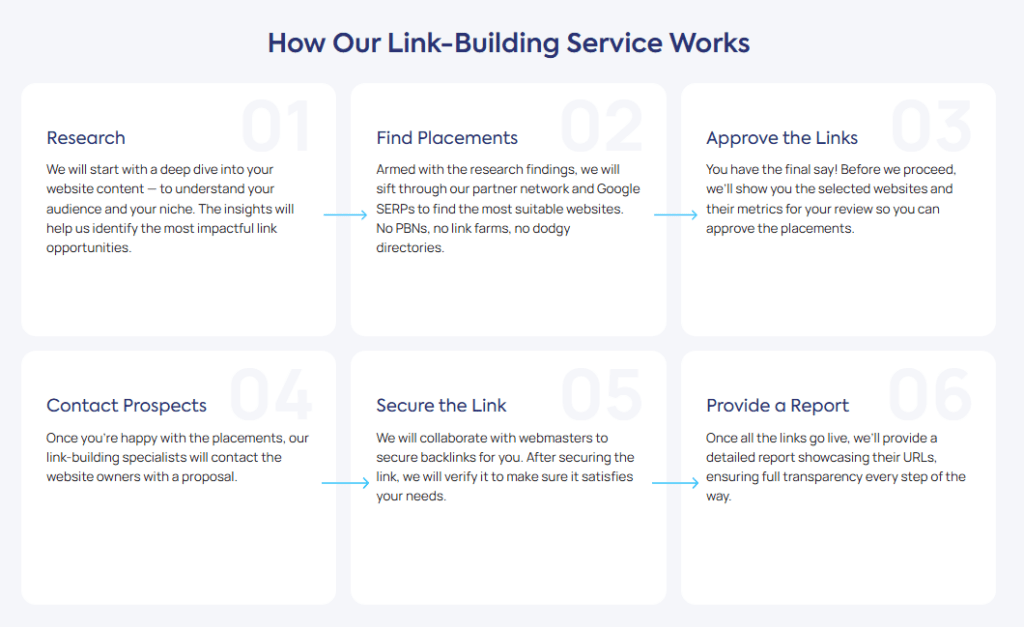
💡Pro-tip! The legal niche is highly competitive, and mistakes can be costly. To give clients extra peace of mind, Editorial.Link sends all chosen placements for pre-approval. If you're happy with the options and link metrics, the placement will go live.
Plus, if any link disappears within six months, Editorial.Link will replace it — no questions asked. You’ll also get a dedicated account manager to oversee your campaign, and you can expect your first batch of live links within 30 days of signing.
📢 Word-of-Mouth
Solid link-building services for lawyers consistently earn praise from clients — and the best place to see it is on public review platforms, where anyone can share their experience with the service.
In this regard, Editorial.Link proudly holds a 5-star rating on G2🌟
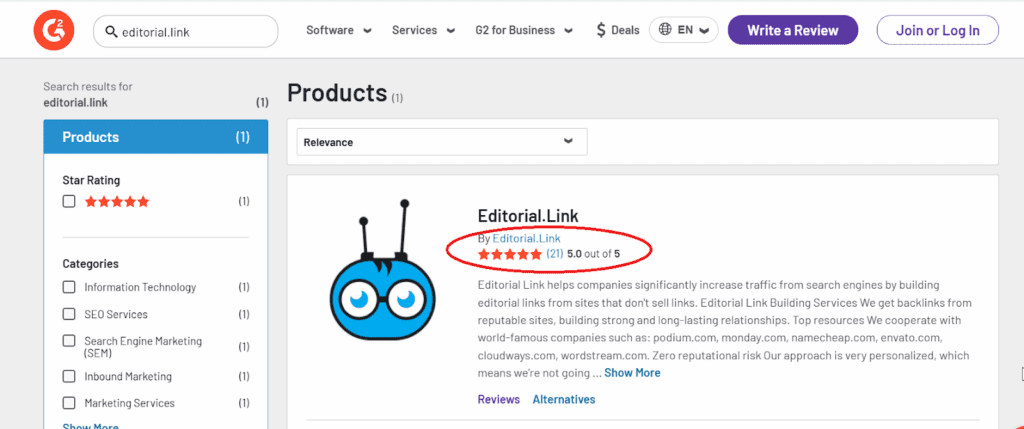
Not to mention the annual awards like "Best Link-Building Agency" from Clutch and DesignRush.
Finally, you can check out Editorial.Link's case studies to see how they solve real client issues and learn how to adapt their methods to your own business.
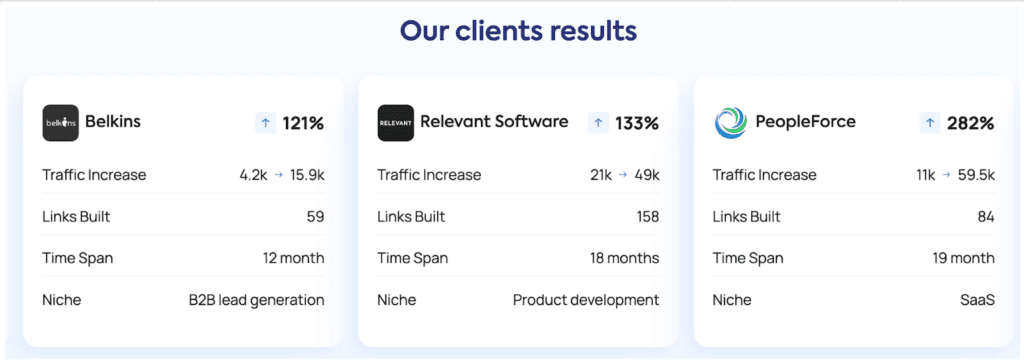
2. INSERT.LINK
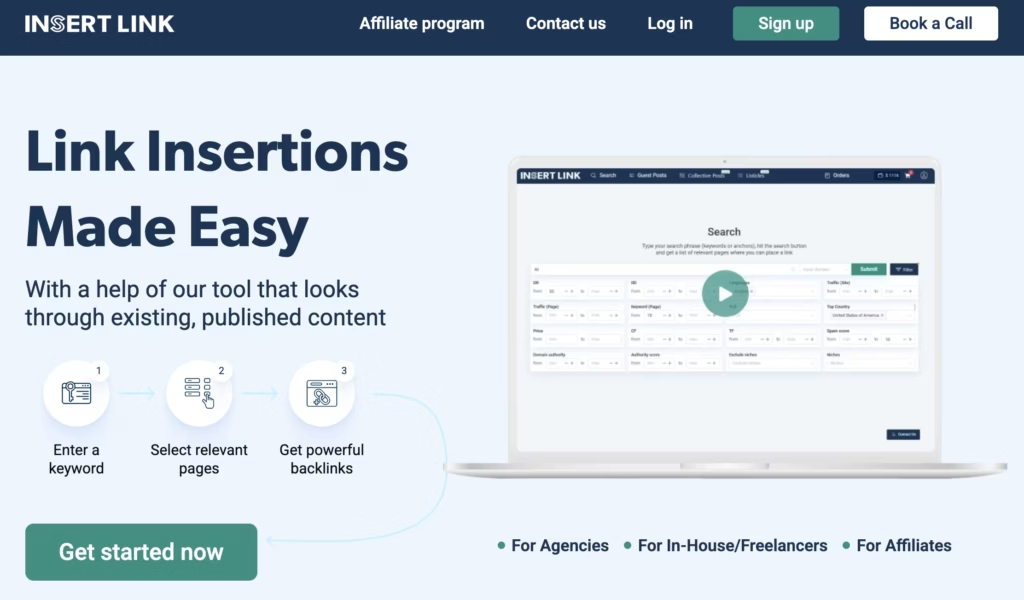
INSERT.LINK is a backlink marketplace platform that makes link-building for lawyers fast and easy by finding premium link placements on trusted legal resources — perfect for busy professionals who want to skip content creation and tap into existing traffic to promote their services.
🧰 What’s there for law firms?
INSERT.LINK operates like a compact search engine for high-impact link insertions and guest posting, using trending keywords to scan a massive database of 23 million pages across 127 locations and 45,000+ websites in industries including legal.
For law firm link-building, this tool is a find — it kills two birds with one stone: you get traffic-driving links from relevant, authoritative legal sites while naturally covering trending keywords with optimized anchor text — no need to pay for PPC!
💡Pro-tip! By the way, CPC for legal keywords remains one of the most expensive in 2026, thanks to high search volume and the significant profit margin a legal professional earns from just one client.
🔗 Link sourcing tactics
INSERT.LINK stands behind the quality of its link sources by offering a carefully curated database of placements — and full transparency to back it up. You can review key performance metrics like Domain Rating, relevance, traffic, and more for each placement, so you know exactly what you're getting. All links are 100% white hat, safe, and fully compliant with Google’s guidelines.
⚙️ Collaboration
You don’t even need to reach out to INSERT.LINK’s support team — just open your dashboard. Head to the search bar, type in your keywords or anchor texts, and hit search. That’s it.
👌 Wise Move! No more bouncing between Google Search, Ahrefs, Semrush, or any other tools — it’s all built in, so your workflow stays super smooth.
Once the results are in, the tool will automatically pick out the pages with the best metrics for you. From there, you can select and purchase the placements that work best for your business.

💡Pro-tip! For beginners in need of attorney link-building services, this tool slashes SEO costs significantly since you don’t need to hire extra outreach teams. Everything stays budget-friendly, with link placements starting at just $2030 — without sacrificing quality, which is a rare find in most backlink marketplaces these days.
📢 Word-of-Mouth
The quality of law firm link-building with INSERT.LINK is consistently recognized by clients through positive reviews, including being named a “Top Link-Building Agency of 2025” by DesignRush.

3. LawRank
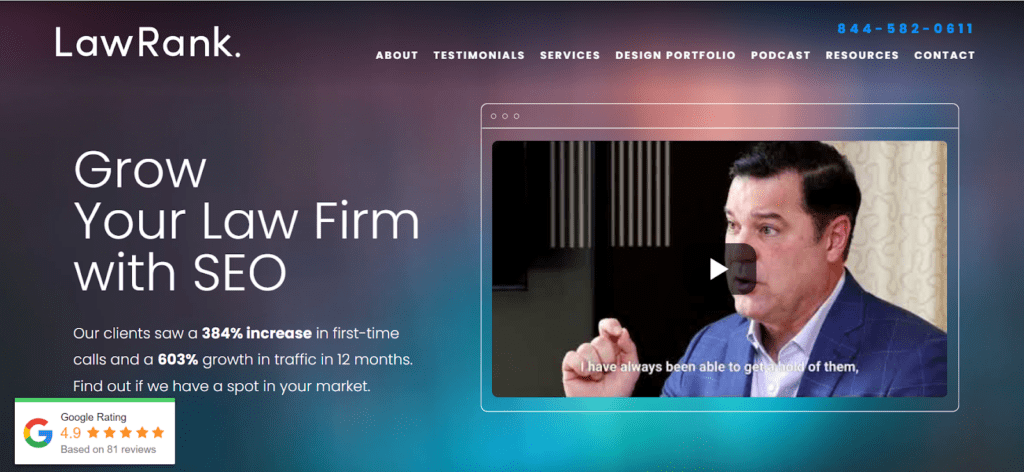
LawRank is the go-to U.S. legal marketing agency that puts attorneys on Google’s page one with bespoke SEO, strategic law firm link-building, custom PPC campaigns, standout legal content, and sleek web design.
🧰 What’s there for law firms?
Pretty much everything you need to grow!
👉SEO for Attorneys – get tailored packages featuring link-building services for lawyers, expert legal content created by attorneys and JDs, and local SEO to help you rank for high-traffic terms like “location + Divorce Lawyer” or “location + Personal Injury Lawyer”, etc.
🔗 Link sourcing tactics
LawRank’s attorney link-building services deliver high-authority backlinks exclusively from top-rated legal directories, trusted niche media, press releases, and both local and national news outlets. Every link is secured through targeted organic outreach by experienced legal marketing professionals, guaranteeing precision, quality, and relevance from start to finish.
👌 Wise Move! Gunning for first-page rankings in competitive fields like “personal injury” or “criminal law” in cities like L.A. or Miami? Then, LawRank might be just what you need.
⚙️ Collaboration
When you select a service you're interested in, you’ll be asked to share your practice area, firm revenue, and contact details. This helps LawRank identify your needs, tailor everything to your specific sales funnel, and provide a customized quote for exactly what you’re looking for.
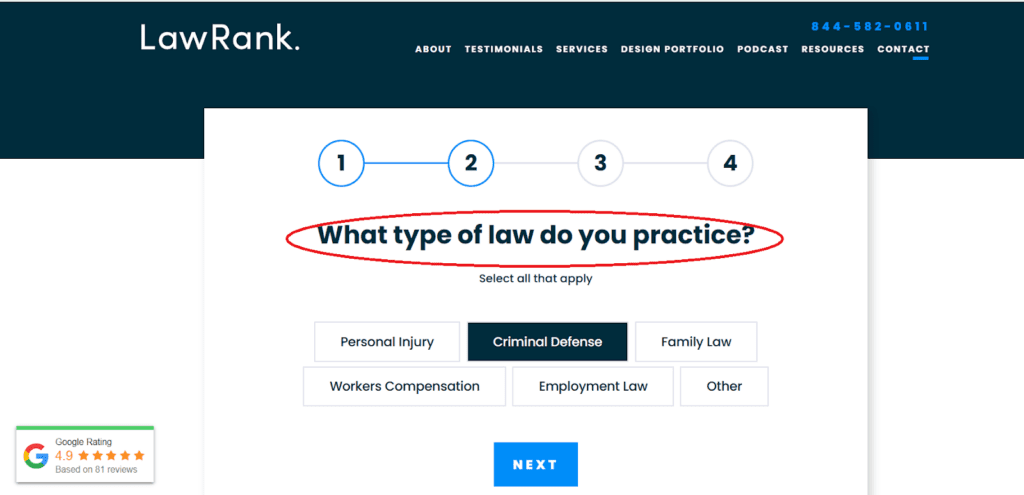
📢 Word-of-Mouth
LawRank’s link-building services for lawyers have earned high praise from long-term partners, including big names like Clutch, CallRail, Birdeye, and more.
Plus, as a certified Google Partner and top authority in attorney Google Ads, LawRank is constantly getting rave reviews from law firms for delivering outstanding SEO results.
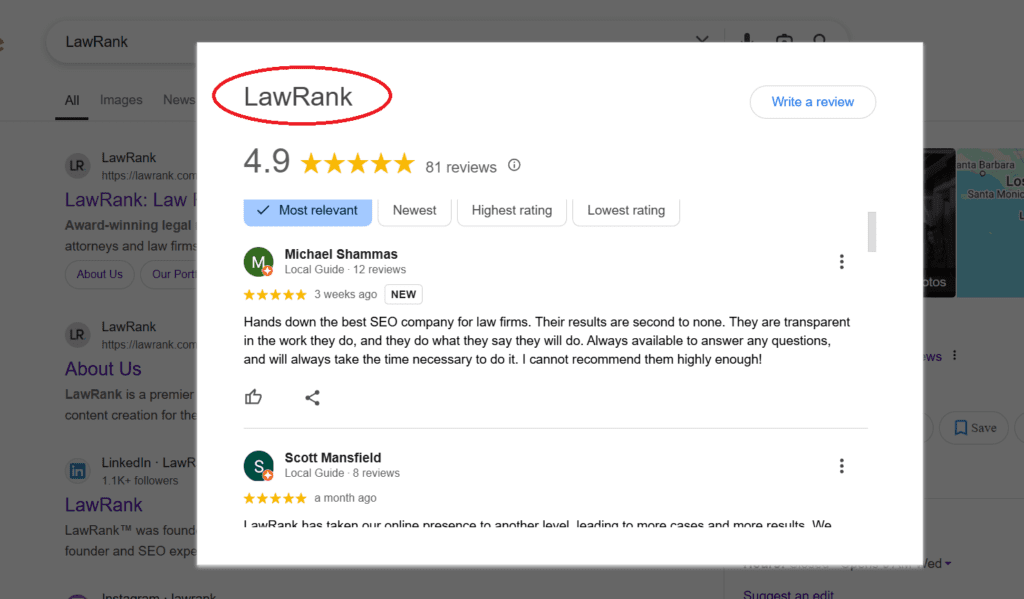
If you want to hear firsthand from prominent legal experts about the quality of their services, just check out the testimonials section on their website.
4. Rankings.io
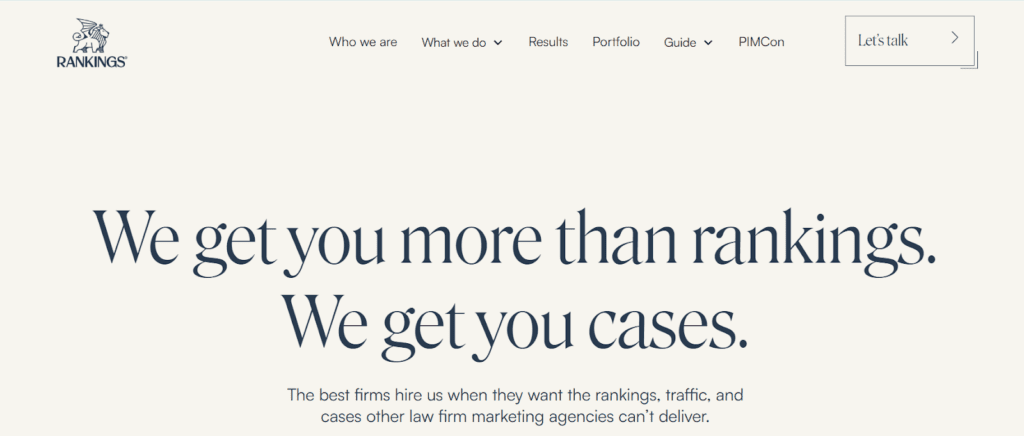
Rankings.io is a highly reputable digital marketing agency focused on helping lawyers secure first-page Google rankings, ramp up website traffic, build top-tier backlinks in the legal industry, and drive a steady flow of qualified leads through real cases.
🧰 What’s there for law firms?
A ton of law-focused services, including:
👉 SEO – full-service solutions to get your business rank higher, with custom legal content, link-building for law firms, onsite optimization, and local SEO.
👌 Wise Move! Rankings.io is laser-focused on helping law firms rank for the most profitable keywords in the following practice areas:
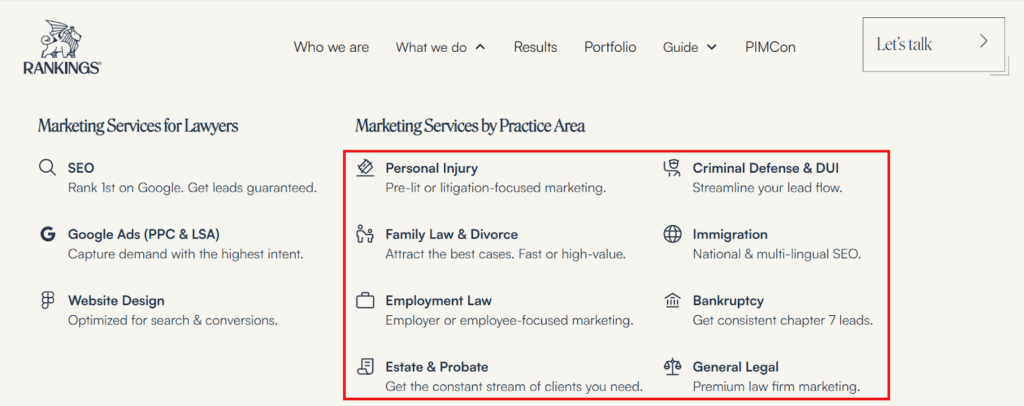
🔗 Link sourcing tactics
With years of legal SEO experience, Rankings.io has built strong, relationship-driven ties with thousands of vetted publishers. Everything’s transparent — you’ll see exactly where the links come from and how the outreach works, including:
- Guest blogging — Rankings.io publishes content on top legal sites and industry blogs, securing high-value backlinks where it matters most.
- Legal directories & Associations — makes sure your firm is featured in respected directories and associations that drive authority and link equity.
- Competitor backlink analysis — by checking your competitors’ link profiles, Rankings.io pinpoints valuable domains and builds smart strategies to match or beat them.
- Content creation — from in-depth guides to original data studies, they craft content that earns links naturally from trusted, high-authority sources.
⚙️ Collaboration
Whether you're requesting attorney link-building services or another type of support, the collaboration process follows these key stages:
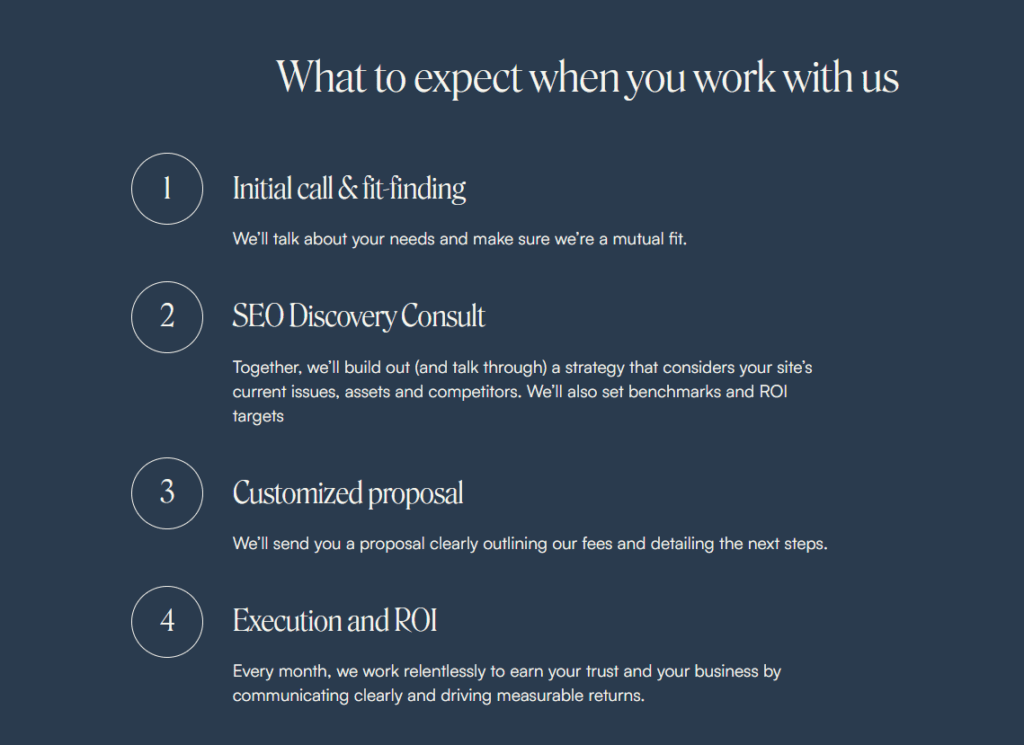
📢 Word-of-Mouth
Since Rankings.io is committed to helping clients earn more case studies as proof of their results, they back it up with a strong portfolio of success stories from satisfied clients — renowned attorneys and respected legal professionals.
On top of that, this law link-building service maintains an impressive average rating of 4.9 across several independent client review platforms like Clutch, UpCity, and, of course, Google Reviews.

5. Hennessey Digital

Hennessey Digital is an ROI‑driven digital marketing agency delivering SEO solutions across multiple industries, with a primary focus on legal SEO, including link-building for law firms.
Founded by Jason Hennessey, a globally recognized SEO authority in the legal arena, the agency draws on over 20 years of experience reverse-engineering Google’s algorithm to drive measurable growth for its clients.
🧰 What’s there for law firms?
As mentioned earlier, Hennessey Digital extends its services to a wide range of industries, offering:
👉 General digital marketing services (SEO, PPC, Paid Media, Content Marketing, Conversion Rate Optimization, Web Development, SEO Consulting, and more).
👉 SEO for Lawyers — a full-service package tailored specifically for law firms, crafted by some of the top experts in legal digital marketing, covering:
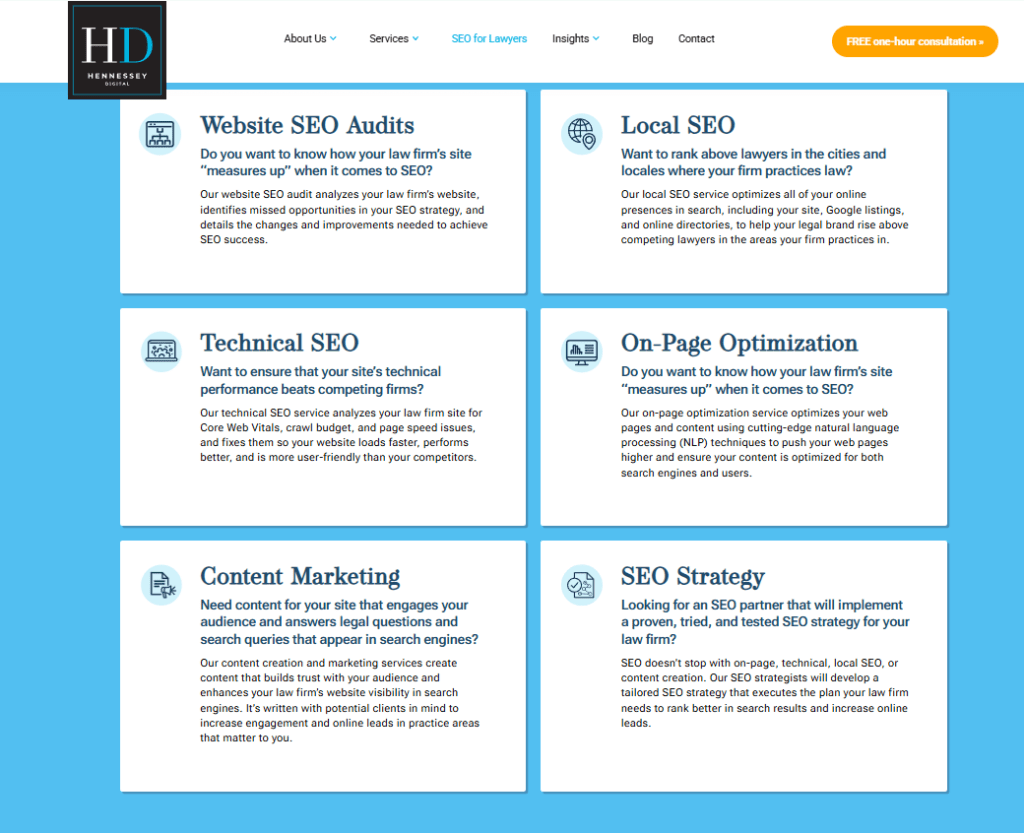
🔗 Link sourcing tactics
Hennessey Digital tailors each white‑hat link‑building strategy to a client’s unique needs, relying on proven methods like:
- Expert outreach — sourcing links through trusted ties with legal directories, industry blogs, and top-tier news sites.
- Authority content — publishing expert-approved legal content that attracts organic, high-value backlinks.
- Digital PR — securing media placements through newsworthy stories that drive traffic and link volume.
⚙️ Collaboration
Interested in a specific service? Simply drop your contact info, tell Hennessey Digital a bit about your business, and let them know what you need. One of their assigned team members will get in touch shortly to go over the details — and as a thank-you, you'll get a free one-hour consultation along with a personalized quote!
📢 Word-of-Mouth
As a token of credibility, Hennessey Digital is frequently featured in respected outlets like The Wall Street Journal, Entrepreneur, National Law Review, and more.
You can also browse their client roster and spot some big names — backed by case studies, video testimonials from solid law firms, and noteworthy performance results they've helped deliver.

Link-Building For Attorneys: FAQ
Now that you have a brief overview of the best services you can use to strengthen your law firm's online presence, we'd like to answer some of the frequently asked questions that come up around link-building for lawyers.
🧐 Is link-building for a law firm hard?
Yes, extremely!
And especially on Google, as many attorneys themselves say, the legal industry is pure "dog-eat-dog competition". And we are not specifically referring to the USA only, where everyone needs a lawyer, but globally as well, it's a cutthroat space.
The competition is fierce, so ranking high is no easy feat. For this very reason, the legal industry is known for having some of the most expensive keywords out there, on par with industries like mortgage, loans, and insurance services.
And this isn’t just a vague statement — take a look at the numbers!
According to Fraud Blocker’s analysis of the top 5,000 most expensive keywords on Google in January 2025, the legal industry dominates, accounting for a significant 19.4% of the search terms reviewed.
Turns out, average CPCs for legal terms in 2025 range from $100 to $210 per click, with “location-based attorney/lawyer keywords” reaching up to $500!
🧐 What is link-building for law firms?
Link-building for law firms is getting top-quality backlinks from established legal resources, authoritative directories, journals, and legal websites of solid repute. These links act as tokens of credibility, authority, and trust for SERPs, making the law firm itself more visible to potential clients seeking legal support.
🧐 Why is link-building important for lawyers?
Reason #1. It’s an extremely competitive niche
The good news is, landing even one client for your legal services can be highly profitable, depending on the case. The bad news is, you'll have to compete not just with other law firms — but with Google itself to get found!
Quality backlinks from reputable legal sources signal to Google that your law firm is trustworthy. As a result, your website can pop up higher in rankings, showing you off to potential clients and helping you get rid of most of your competitors.
Reason #2. Legal keywords are extremely expensive
Sure, rich law firms can afford it — but for beginners? It’s a disaster. $100 to $210 per click? That’s a fast track to going broke!
You're way better off building quality backlinks from reputable legal sources and creating link-worthy content. It drives traffic, boosts visibility, and pays off long-term — unlike burning thousands every month on PPC and ads.
Reason #3. Law firms monetize their reputation
If you’re in the legal sector, your online rep is equivalent to your potential earnings. Getting links from respected legal publications might take time, but it's the most effective way to ramp up your firm’s visibility, brand recognition, and authority. Clients who value these traits will choose your firm over the rest, every time.
🧐 How much do link-building services for lawyers cost?
That largely depends on the link provider and the scale of services your business needs.
However, for local link-building for lawyers, services from INSERT.LINK are a solid option — you can get 6–8 high-quality links for around $400–$500 per month.
If we’re talking about premium link-building for law firms — through partnerships with well-known legal publications — the cost per high-quality link can start around $300. So, you’re looking at a monthly budget of $3,000 to $5,000 for a serious link acquisition strategy.
🧐 Best Link-Building Strategies For Law Firms
No matter whether you are doing link-building for attorneys in-house or hiring a specialized service, it's crucial to know what’s working best right now for sourcing such niche-targeted links.
Based on our own experience, here are our top strategies for 2025!
👉 Listicle link-building
Listicle link-building is the practice of earning links by getting your company, brand website, or content mentioned in list-style articles on other reputable websites.
It can be a bulletproof way to get FREE backlinks — but there’s one condition: the site owner, editor, or content creator has to genuinely WANT to include you in their “Best of' or “Top 5” list because your company truly delivers value and stands out.
🧩 Why it matters: In the era of advanced LLMs, users prefer skimming quick pros-and-cons lists to make snap decisions — especially when choosing services like legal representation. Plus, listicles often make it into Google’s featured snippets, and being “recommended” by a reputable source makes consumers far more likely to check out your law firm.

👀 Example: Listicles with keywords like “Best” or “Top” are most likely targets for featured snippets thanks to their high search volume and traffic potential. Securing a spot in such a listicle earns you credibility, exposure, and a steady stream of new audiences.
👉 Digital PR link-building
Digital PR link-building is the process of earning links from top news outlets, high-traffic websites, trusted resources with strong authority, and major media platforms with a large following.
🧩 Why it matters: Even for a modest law firm, getting a shoutout from a major legal website, directory, or association solves multiple problems — you're tapping into someone else’s loyal audience, gaining exposure, and attracting traffic from people who take that “recommendation” seriously and click through to learn more about your.
If your services or content resonate with new audiences, a single link can lead to many more over time!
💡 Pro-tip! In fact, according to our survey of 113 SEO experts, digital PR ranked as the top link-building tactic in 2024 — and this trend shows no signs of slowing down in 2025.
👉 Linkable assets
Linkable assets need no introduction — they’re natural backlink magnets. Whether it’s exclusive stats, research studies, free tools, up-to-date infographics, niche guides, or expert commentary, these pieces of content attract links on their own and can keep earning them for years — especially if updated regularly.
🧩 Why it matters: The idea’s simple: create something the legal industry is “dying to find” — share overlooked hacks, break down tough cases, or debunk common controversies. If it’s a rare gem, the links will follow naturally. No extra push needed.
👀 Example: Collecting in-house statistics is a time-consuming task that no one wants to take on, but everyone wants to see the industry’s numbers.
That’s why here at Editorial.Link, we take it upon ourselves to ask SEO experts burning questions each year, creating rare stats like our 2024 State of Link-Building Report.
Think we worked on it in vain? Nope! It's a strategic link-building move that earned us backlinks from giants like neilpatel.com, siegemedia.com, buzzstream.com, and more.
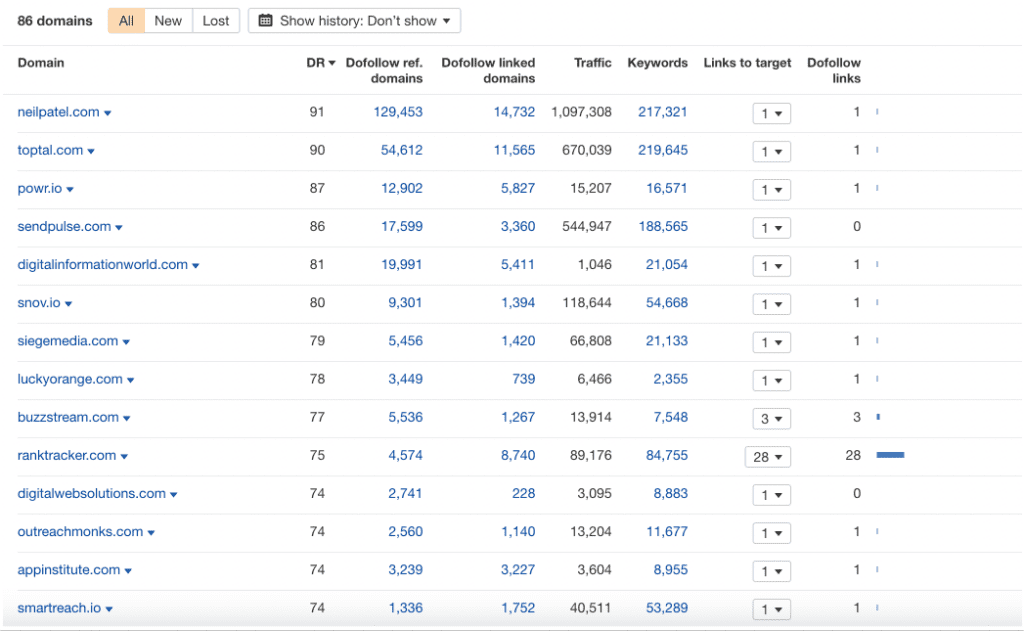
👉 Legal directories
This is a form of directory link-building, but with a more targeted approach — sourcing links from online directories aimed at professionals, attorneys, and experts in the field.
🧩 Why it matters: In fact, it’s one of the easiest forms of link-building for law firms. All you need to do is list your website link in a relevant directory. You’re targeting an interested audience actively seeking the best options, and since they trust these resources, the chances are high that you’ll attract more requests for your legal representation.
👀 Example: Just make sure you’re listing your services on directories with a DR of at least 80-90, like these:
- Avvo.com
- Nolo. Com
- Lawyers.com
- HG.org
- FindLaw.com
Here’s how easy it is for potential clients to contact you when you’re mentioned in a reputable directory — straight to the website.
👉 Guest posting
Guest posting is also one of the most effective ways to do link-building for law firms.
Why? Because law firms can make use of the insider knowledge of their top legal experts and score backlinks by offering unique, experience-packed articles to trusted sites that are looking for rare content. Everyone wins!
🧩 Why it matters: For both newbie and seasoned legal experts, it’s a fantastic way to showcase themselves and their services. Plus, the audience of a reputable host site gets to discover fresh voices in the field — who knows, it might even turn them into clients! And if not clients, at least it’ll bring traffic to rank better.
👀 Example: There are sites like the UK-based New Law Journal that only feature articles from active lawyers, keeping things fresh and relevant.
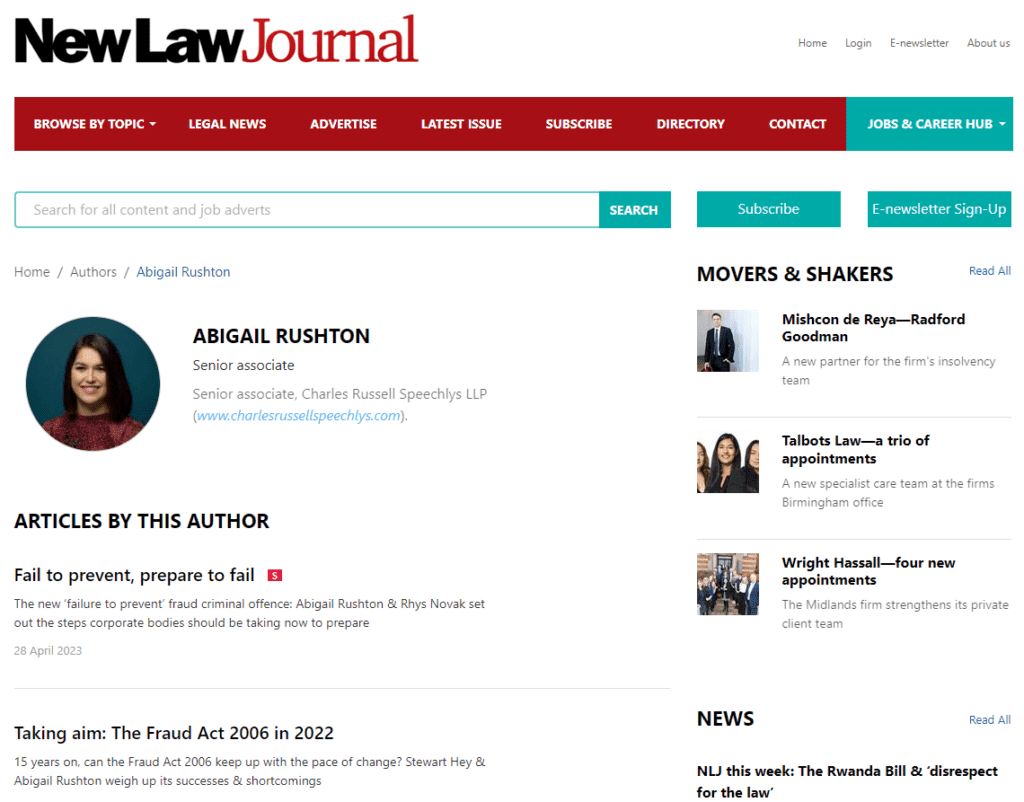
Try pitching your expertise there, grab a backlink, and see what happens with traffic and clientele!
💡 Pro-tip! Nevertheless, it never hurts to offer your legal advice in article form to other high-DR sites — people need it across different fields.
Final Words
Link-building’s only gotten tougher over the years, that’s a fact. But if you are doing link-building for lawyers, get ready to hustle — you’re not just competing with other services, you’re also battling for Google’s attention.
No worries, though — you’ve got two solid, Google-friendly options. First, you can take the slow-and-steady route with linkable assets, digital PR, listings, and directories. It’s a gradual build, but it works.
In summary, Editorial.Link is your shortcut to better rankings and real leads - with legal-focused link-building that saves you time and delivers results.

